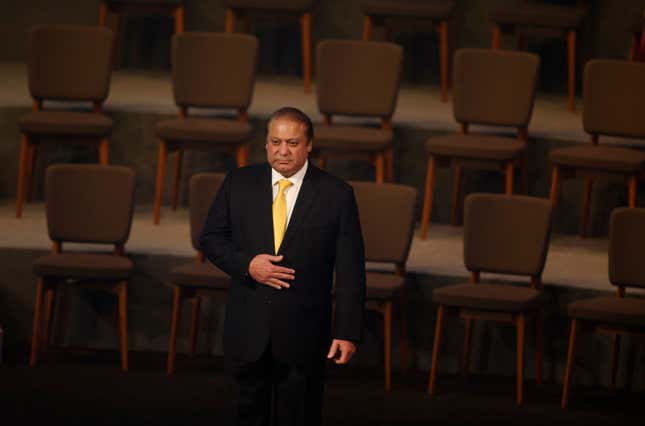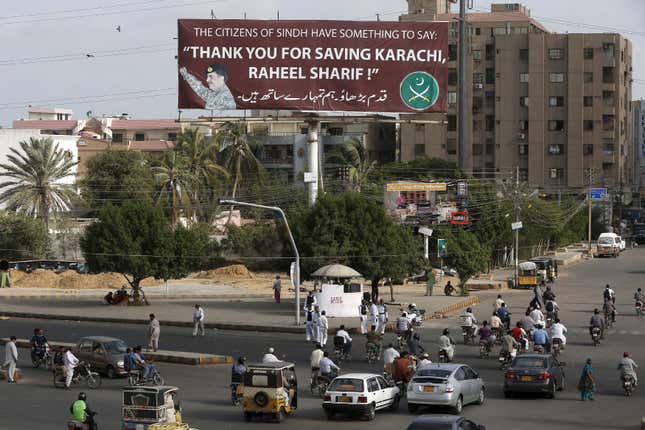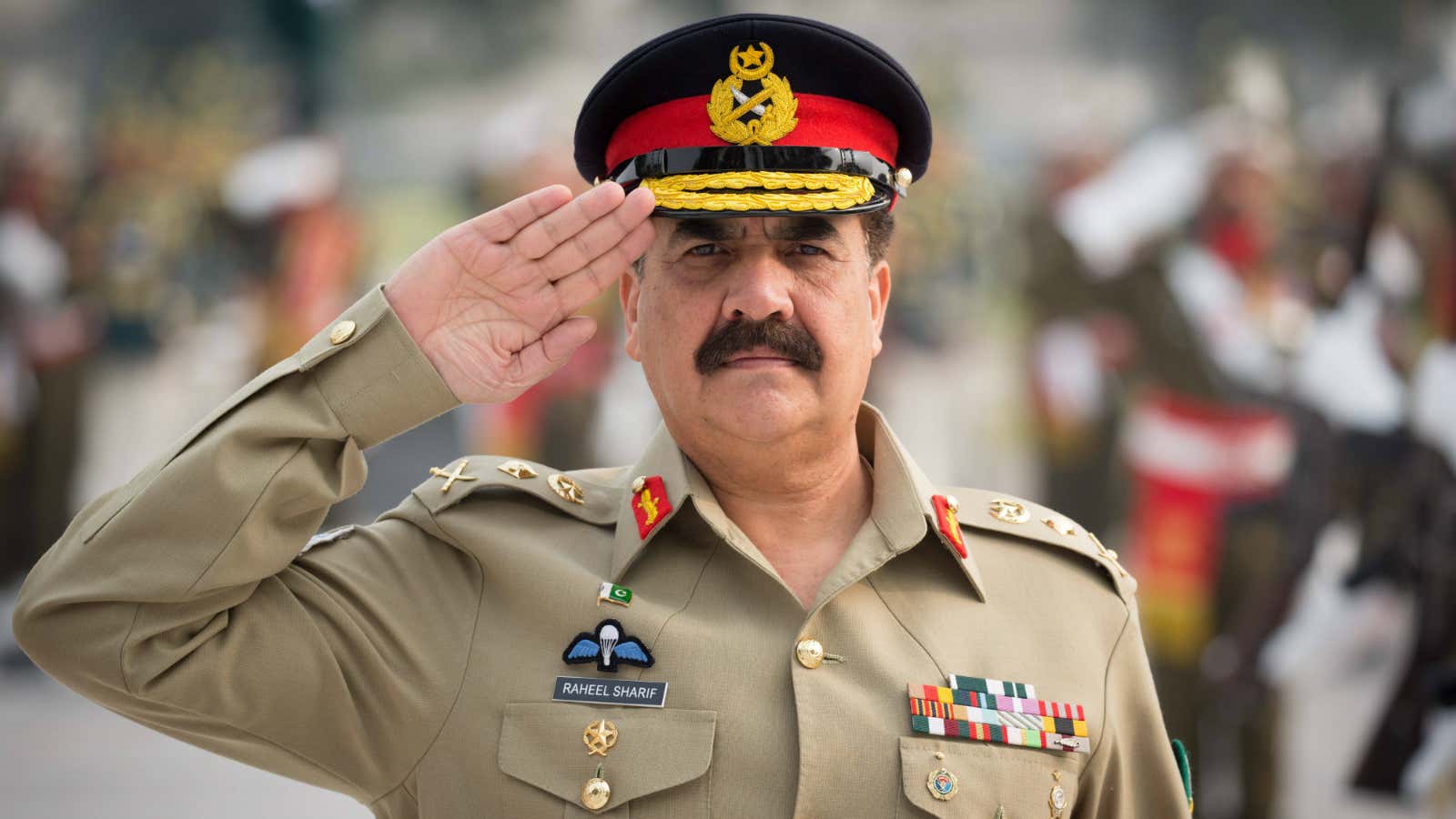Relations between India and Pakistan are entering crisis mode as tensions rise over Kashmir, Balochistan, and the use of proxy groups. South Asian history tells us this kind of brinkmanship could drag on for months, even years, as both sides jockey for advantage until they reach a new equilibrium.
Who will call the shots while all of this plays out?
On the Indian side, prime minister Narendra Modi seems to be firmly in charge, balancing the professional advice of the armed forces and civil bureaucracy with the political demands of an invigorated Hindu nationalist movement and a noisy media machine. The Pakistani situation is far more opaque: an evolving civil-military relationship whose final shape is a riddle wrapped in a mystery even to seasoned observers.
It is clear, however, that much depends on just what sort of person becomes Pakistan’s next chief of army staff (COAS) when General Raheel Sharif retires at the end of November.
Ministry of the inferior
For the last two years, Pakistan has had a de-facto separation of powers where the military, under General Raheel, decides all national security policy, while the Pakistan Muslim League (Nawaz) government under prime minister Nawaz Sharif manages the economy, public services (such as they are), and the aspects of internal security that the army is willing to delegate.

This is seemingly a silent return to the system of diarchy between 1919 and 1947 when the British Raj acknowledged the impossibility of ruling without some form of democratic consent, but remained equally convinced that politicians could not be trusted to direct the defence of the realm.
While a consistently strong civilian leadership stamped out such attitudes in the Indian military after independence, the zero-sum bickering of Pakistan’s political class has only reinforced these ideas in the country’s officer corps.
However, in Nawaz Sharif’s case, the military’s distrust goes deeper, and directly impacts the current situation. There are widely circulated and long-standing claims that the Sharif family’s business interests (estimated in the hundreds of millions of dollars) in areas such as sugar and steel, rather than ideals or national interests, drive his conciliatory approach to India. These rumours are so damaging in the current climate that Nawaz Sharif’s son has appeared on one of Pakistan’s most watched talk-shows to deny the claims.
It has been understood in Pakistan since the 1950s that elections are not the only route to power for a party; generating a political crisis serious enough to compel the “deep state” to step in and dismiss the sitting government does just as nicely. Nawaz Sharif has faced just such a campaign waged by the former cricketer Imran Khan and his Pakistan Tehreek-e-Insaaf (PTI) since the 2013 elections. It was in order to secure both the military’s support in containing the PTI’s protests of 2014 and to avoid a coup that Nawaz Sharif traded away his decision-making on foreign policy, including vis a vis India, to General Raheel Sharif.
Campaigning for hearts and minds
Given the army’s silky-soft coup in 2014, does the prime minister’s post matter at all in Pakistan? The short answer is yes. The difference from the colonial era, or even the periods of overt military dictatorship, is that the current division of power is not one set down in written law. Instead, an army chief must gain more popular support in Punjab province—which holds the bulk of the country’s population and the bulk of its wealth—and the army itself, compared to a ruling party leader. The outcome of such political competitions are far from predetermined by the army’s strength.
For example, president Asif Ali Zardari, the teflon-like and notoriously corrupt husband of the slain Benazir Bhutto, had skilfully hung on to power for a full term (a first in Pakistani history) from 2008 to 2013 in the face of major pressure from then COAS General Ashfaq Kayani.
Although Zardari was forced to alter some policies, it still seemed like a new dawn for civilian authority in Pakistan. Zardari fared better than Nawaz Sharif as he played politics better by skilfully reaching out to the opposition to build solidarity against the military.
But it also had a great deal to do with the calibre of his opposite number. General Kayani faced a persistent murmur of questions about the failure to hunt down those attacking the Pakistan Army, about US impunity in striking on Pakistani soil, and about financial conflicts of interest, all of which echoed questions that had undermined Musharraf’s personal popularity as well as that of the army.
In comparison, General Raheel Sharif paid far closer attention than Nawaz Sharif or his military predecessors to shifting public mood. Buffeted by events such as the Bin Laden raid and the Army Public School massacre, there is an intense hunger for integrity and competence in high office, and major anxieties over a growing sense of eroding national sovereignty and increasing physical insecurity in major cities.
These were conditions whose persistence meant Pakistanis were becoming increasingly willing to blame their own leadership rather than any “foreign hand.” General Sharif’s successes in improving security perceptions without taking over the government or extending his term enhanced not only his personal reputation but the power of his office.
The next COAS will inherit that political capital, but it can be quickly squandered if he underestimates either the fickleness of public opinion—or the latent strength of a prime minister who would most likely win a snap election held tomorrow.
Meanwhile, there is one area in which prime minister Sharif’s word still matters. Despite his semi-neutered state, the consensus is that he still has the power to choose General Sharif’s successor.
Appointments: Always a crapshoot
This is the bit where you might expect a description of the leading candidates and their chances. Shortlists have already been put out, but the chance remains that Sharif could always pull out a wild card from the middle of the deck. The prime minister, the contenders, and the sitting COAS are engaged in a high-stakes game. The air is far too thick for reliable analysis with all the false tells intended to protect the players options in the run-up to the big decision and to shape the narrative in the aftermath. In any case, the truth is that knowing a candidate’s name and his bio is not nearly enough to know what sort of COAS he will turn out to be.
Even Pakistan’s most experienced and best-advised civilian leaders have a mixed record in assessing just what sort of person they’re selecting as army chief.
Zulfiqar Ali Bhutto first came to power in 1971 thanks to a junior officer mutiny against president and army chief General Yahya Khan’s comprehensive failure in the war. In his determination to assert civilian primacy, he fired the next COAS and selected General Tikka Khan (still remembered in Bangladesh as the “Butcher of Bengal”) who served him with the utmost personal loyalty. At the end of Khan’s term in 1976, the prime minister, rather than granting an extension, or accepting his handpicked successor, reached deep into the officer pool to choose Zia-ul-Haq for his fawning manner and apparent spinelessness.
A year later Zia deposed, arrested, and eventually hanged Bhutto. Although General Zia’s professional military reputation with his fellow officers was poor, he was politically savvy enough to not only rule longer than anyone else in Pakistan’s history, but to also become the sole army dictator to avoid being thrown out of office in disgrace by angry mobs.

Nawaz Sharif’s experience in 1998-99 mirrored Bhutto’s, although he was luckier insofar that he has lived to tell the tale. Like Bhutto, he was an experienced former protégé of the military determined to put them in their place. Like Bhutto, he managed to dismiss an army chief without triggering a coup. Like Bhutto, he promoted someone out of turn, hoping this would ensure personal loyalty. Like Bhutto, he was overthrown by his man the next year.
In this case, the trigger for the coup was not a national political crisis but the top brass’s determination to prevent him from summarily firing yet another COAS that still held the army and the public’s confidence. Pakistani elites and the Punjab welcomed the coup because Nawaz Sharif, like Bhutto 20 years before, had sharply diminished his popularity by playing politics hard instead of playing it well.
Fast-forwarding to June 2013, Nawaz Sharif was elected prime minister again after the first “normal” transition between elected governments. It was also time to choose the next COAS and General Sharif’s selection by prime minister Sharif raised no eyebrows—he was described by many as an apolitical, quiet professional, unlike his predecessor General Kayani. Less than a year later, however, General Sharif was calling the shots in Pakistan. Now, in 2016, he is on track to retire as perhaps the most highly respected COAS in Pakistan’s history.
Flying through the storm
All of this brings us back to the dramatic atmosphere of the present. It is clear that the PTI smells opportunity in the current moment and will pile on the pressure rather than lend support to the ruling party—their chief minister in Khyber-Pakhtunkhwa publicly declared that military rule would be better than “corrupt democracy.”
Can Sharif actually hold onto his remaining powers, whether it’s managing the China-Pakistan Economic Corridor or selecting the next COAS if the crisis with India deepens? It remains to be seen.
Whoever’s choice he is, the next army chief will decide for himself how directly and visibly he wants to intervene in the country’s politics. How much authority he can wield will depend on how well he is seen to be holding up under Indian pressures, which will come from every possible direction.
